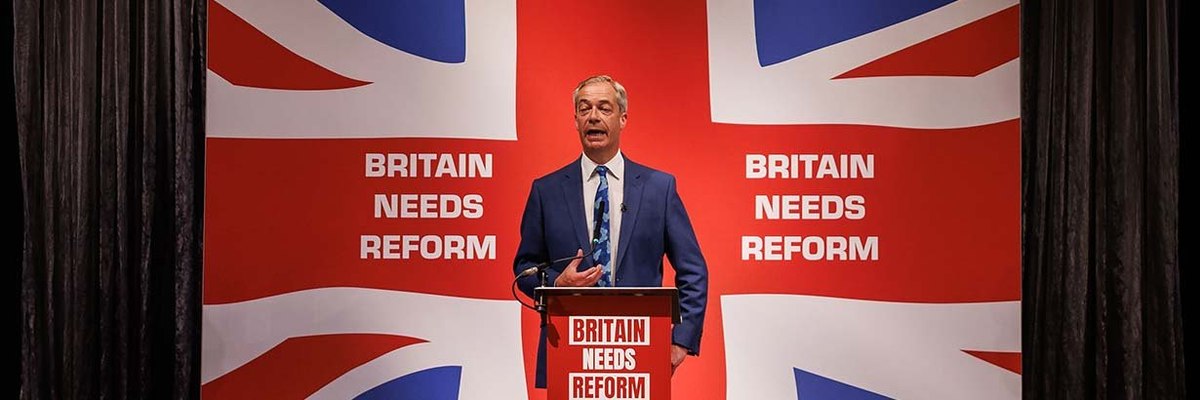Most Britons have a negative view of the party, but Reform UK voters’ views are uniquely favourable
Today and tomorrow, Reform UK will gather in Birmingham for their first party conference since their seismic performance in July’s election. Spurred by Nigel Farage’s game-changing entry into the campaign, they won five MPs, came second in nearly 100 more seats and won the most votes ever of any party other than the Conservatives, Labour or Liberal Democrats (and their predecessors) in a general election.
But while the party has firmly established itself as a key player in British politics, the party has many more detractors than supporters. Just over a quarter of Britons (27%) have a favourable view of the party, while twice as many (56%) have an unfavourable view.
Naturally, the positivity disproportionately stems from Reform UK voters, nearly all (97%) of whom see the party in a favourable light. But what’s so notable is the enthusiasm. Two-thirds (67%) are describing their opinion of Reform as ‘very favourable’, which is a scale rarely seen in contemporary politics. Even in the aftermath of their landslide victory, only one in three Labour voters (35%) said they had a very favourable opinion of Labour, while our poll last week on the Lib Dems showed only three in ten Lib Dem voters (29%) are that positive about the party they voted for in July.
Against this, though, are the fact that not even one in ten Labour (9%) or Lib Dem voters (8%) have a favourable view of Reform UK, while more than eight in ten see the party negatively, including seven in ten (69-72%) describing their opinion of the right-wing party as ‘very unfavourable’. Conservative voters are more divided: while four in ten (41%) have a positive view of Reform, nearly half (47%) have an unfavourable view.
Regardless of opinions of Reform UK itself, four in ten Britons (42%) do see the party as having a degree of influence on British politics, even if another four in ten (41%) see the party as holding not much or even no sway at all.
Compared to the clear party political divide in whether people see Reform UK positively, the view that the party holds influence is more uniform across parties. Reform voters are the most likely to feel the party has an impact, with just over six in ten (63%) seeing the party as at least a little influential in British politics, though between 43-47% of Conservative, Labour and Lib Dem voters agree.
Whether the party should have more or less influence, though, returns to the familiar pattern. Just as around a quarter of Britons (27%) have a favourable opinion of Reform UK, around a quarter (27%) feel they should have more power, with this including the vast majority of Reform voters (94%), four in ten Conservatives (40%) and no more than one in ten Labour or Lib Dem voters (8-9%).
However, against this are 45% of Britons who would like the party to be less influential within British politics, as well as one in nine (11%) who feel they currently have the right degree of impact.
How do Britons see Reform UK?
This disconnect between how Reform UK voters see their party and how Britons as a whole see them is particularly noticeable when looking at which common political descriptors the public apply to the party.
The most applicable descriptions in the eyes of the British public are ‘extremist’ and ‘should not be near power’, which four in ten (39%) selected from a list that has been asked about all parties. Around three in ten (29-33%) also say they would refer to Reform as ‘nasty’, ‘dishonest’ and ‘only interested in themselves’, while just over a quarter of Britons (26-27%) felt that ‘has unworkable policies’ and ‘unprofessional’ applied.
Reform UK voters, though, disagree significantly, with negligible numbers selecting any of those options. Instead, the descriptions they most feel are right for the party are ‘has a clear sense of purpose’ (70% of Reform UK voters feel applies), ‘has sensible policies’ (66%) and ‘seem like normal people’ (51%).
Around four in ten Reform supporters (39-42%) would also describe the party as ‘likeable’, ‘competent’, ‘interested in public service’ and ‘fit to govern’, thoughts that have occurred to fewer than one in ten of the British public (8-9%).
Who do Britons think Reform UK care about?
Beyond the perceived qualities of a party, another key component of party image is who voters associate them as concerned about.
Of the groups asked about, rich people are the one that the British public see Reform UK as caring most about, with half of Britons (49%) viewing the party as invested in the concerns of the wealthy. Four in ten British people (40-41%) also see the party as caring for the interests of people in the South of England, businesses and the middle class.
Reform UK are least likely to be seen to care about trade unions, immigrants, the LGBT community, benefit claimants and ethnic minorities, groups that only 11-12% of the public see Nigel Farage’s party as being interested in and majorities of Britons (54-69%) view Reform as not caring about.
Once again, however, there is a disconnect between how the British public and Reform UK voters see the party. While only one in three Britons (35%) feel that Reform UK care about the working class, nine in ten (89%) Reform voters do, more than those who see the party they endorsed in July as being interested in the middle class (77%) or rich people (50%).
Likewise, while Britons tend to see the party as a southerners’ party, with 41% feeling the party care about people in the South of England and only 27% seeing them as interested in those outside the South, Reform UK voters see no real difference between the two groups, with three-quarters (75-76%) seeing the party as caring about both.
Another stark divide is with women – eight in ten Reform UK voters (82%) believe the party cares about women, compared to only a quarter of all Britons (24%) and just one in five women themselves (20%). Similarly, while eight in ten Reform voters (81%) see the party as interested in what affects young people, only 23% of 18-24 year olds feel the same. Younger Britons are instead more likely to see the party as caring for older people, with half of 18-24 year olds (51%) associating Reform with elderly interests.
Perhaps most importantly in understanding support for the party, though, are the numbers who feel the party cares about them. More than eight in ten Reform UK voters (84%) would say the party cares for people like them, against only 2% who feel they don’t.
How do you feel about Reform UK, other political parties, and everything else? Have your say, join the YouGov panel, and get paid to share your thoughts. Sign up here.
Photo: Getty






